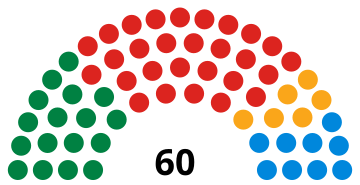| |||||||||||||||||||||||||||||||||||||||||||||||||||||||||||||||||
All 60 seats to the National Assembly for Wales 31 seats needed for a majority | |||||||||||||||||||||||||||||||||||||||||||||||||||||||||||||||||
|---|---|---|---|---|---|---|---|---|---|---|---|---|---|---|---|---|---|---|---|---|---|---|---|---|---|---|---|---|---|---|---|---|---|---|---|---|---|---|---|---|---|---|---|---|---|---|---|---|---|---|---|---|---|---|---|---|---|---|---|---|---|---|---|---|---|
| Turnout | 46.3% | ||||||||||||||||||||||||||||||||||||||||||||||||||||||||||||||||
| |||||||||||||||||||||||||||||||||||||||||||||||||||||||||||||||||
 | |||||||||||||||||||||||||||||||||||||||||||||||||||||||||||||||||
| |||||||||||||||||||||||||||||||||||||||||||||||||||||||||||||||||
| This article is part of a series within the Politics of the United Kingdom on the |
| Politics of Wales |
|---|
 |
The 1999 National Assembly for Wales election was held on Thursday 6 May 1999 to elect 60 members to the Senedd, at the time called the National Assembly for Wales (Welsh Parliament; Welsh : Cynulliad Cenedlaethol Cymru). It was the first devolved general election held in Wales after the successful 1997 Welsh devolution referendum. The election was held alongside the Scottish Parliament election (also the first of its kind) and English local elections.
Although Welsh Labour were the biggest party, they did not gain enough seats to form a majority government and instead entered into coalition with the Liberal Democrats. The election was marked by the historically high level of support for Plaid Cymru, who won their highest share of the vote in any Wales-wide election and remains their highest number of seats in a Senedd election to date. The party won considerable support in traditionally safe Labour areas such as the South Wales Valleys, winning Rhondda and Islwyn and narrowly failing to win a number of other seats.
The overall turnout of voters was 46.3%. [1] This would remain the highest ever turnout for a devolved election in Wales until the 2021 Senedd election, which saw 46.6 of voters cast their ballot. [2]





